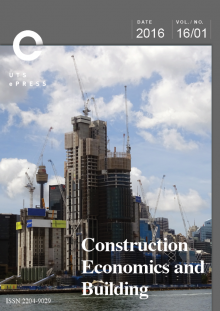Personal-organisational value conflicts and job satisfaction of internal construction stakeholders
Main Article Content
Abstract
This paper concerns the issue of value conflicts in construction organizations. This research was conducted in the Malaysian construction industry to fill the gap in the knowledge in areas of organizational behaviour in the construction industry in terms of the possible effects of conflicts on the job satisfaction of internal construction stakeholders. The conflicts considered are those rooted in differences between personal and organizational values. This research targeted professional project consultants identified as architects, engineers, and quantity surveyors as the internal construction stakeholders in Malaysia. The personal-organizational values and the level of job satisfaction of the stakeholders were assessed using a questionnaire survey. To achieve the research objective, comparative and hierarchical regression analyses were performed. The results generated by the analyses indicated a high level of value conflicts in the construction organizations which significantly and negatively affected job satisfaction of the internal stakeholders. Therefore this research, through investigating the potential effect of value conflicts on the stakeholders’ job satisfaction, reveals the importance of the interaction between personal and organizational values in construction organizations which contributes to the extant literature of organizational behaviour in construction.
Article Details
Section
Authors who publish with this journal agree to the following terms:
a) Authors retain copyright and grant the journal right of first publication with the work simultaneously licensed under a Creative Commons Attribution License that allows others to share and adapt the work with an acknowledgement of the work's authorship and initial publication in this journal.
b) Authors are able to enter into separate, additional contractual arrangements for the non-exclusive distribution of the journal's published version of the work (e.g., post it to an institutional repository or publish it in a book), with an acknowledgement of its initial publication in this journal.
c) Authors are permitted and encouraged to post their work online (e.g., in institutional repositories or on their website) prior to and during the submission process, as it can lead to productive exchanges, as well as earlier and greater citation of published work (See The Open Access Citation Advantage Service). Where authors include such a work in an institutional repository or on their website (ie. a copy of a work which has been published in a UTS ePRESS journal, or a pre-print or post-print version of that work), we request that they include a statement that acknowledges the UTS ePRESS publication including the name of the journal, the volume number and a web-link to the journal item.
d) Authors should be aware that the Creative Commons Attribution (CC-BY) License permits readers to share (copy and redistribute the work in any medium or format) and adapt (remix, transform, and build upon the work) for any purpose, even commercially, provided they also give appropriate credit to the work, provide a link to the license, and indicate if changes were made. They may do these things in any reasonable manner, but not in any way that suggests you or your publisher endorses their use.
